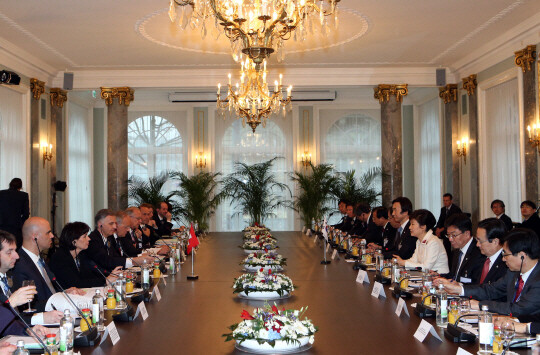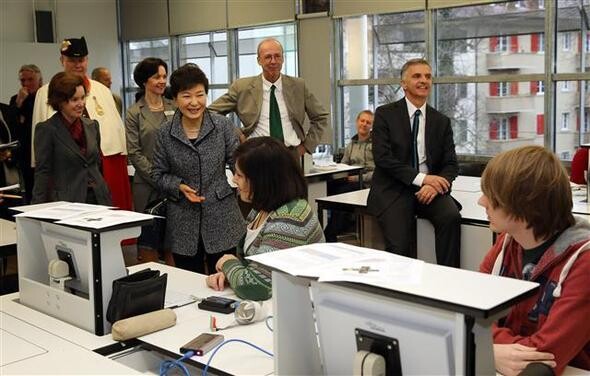hankyoreh
Links to other country sites 다른 나라 사이트 링크
Pres. Park says N. Korea will have to change

By Seok Jin-hwan, Blue House correspondent in Bern and Choi Hyun-june, staff reporter
President Park Geun-hye came out with another provocative statement on Jan. 20 during a summit in the Swiss capital of Bern.
“North Korea may need to change by itself, but if it can’t do that, then we need to create an environment where it has no choice,” Park said at the summit with Swiss President Didier Burkhalter. Terms like “change,” “openness,” and “reforms” are seen as taboo in North Korea, since they hint at the possibility of regime change.
Park’s remarks in Bern continued a trend since the start of the year of dismissing Pyongyang’s proposals for improved relations as “lacking sincerity.”
“North Korea has been talking about improving inter-Korean relations recently, but it’s difficult to sense any sincerity,” Park continued. “What we need more than anything else is the North Korean leadership’s strategic determination to abandon its nuclear program.”
Her statement, while ostensibly a call for change from within, also expressed distrust of Pyongyang and emphasized the role of environmental changes in bringing about change. Park had indicated before that she planned to maintain a hard line. Now that she has made a potentially provocative statement aimed at ramping up pressure on North Korea, the question is how it will respond. During a visit to India on Jan. 18, Park had called for an “impregnable security posture” in response to North Korea’s “momentous proposal,” pointing to past examples of “disguised peace offensives.”
Park also praised Switzerland for denouncing North Korea’s nuclear tests and taking an active role in UN Security Council resolutions sanctioning Pyongyang.
At the same time, it was also reported that a US nuclear-powered aircraft carrier would not be taking part in joint military exercises with South Korea in February. On Jan. 21, a source with the South Korean Joint Chiefs of Staff said the US military has “tentatively decided not to send its Navy’s aircraft carriers to the waters around the Korean Peninsula during this year’s Key Resolve exercises.”
The statement was referring to the 97,000-ton USS George Washington, part of the US 7th Fleet stationed in Japan. Repairs to the aging vessel were given as the official reason for its sitting out the exercises, but analysts suggested the decision to avoid needlessly provoking Pyongyang may have been another factor.
Attention is now turning to the effect the absence of the carrier - which North Korea sees as a major threat - on quieting Pyongyang’s denunciations of the exercises. No decision has been made yet on whether they will include B-2s, B-52s, and other bombers capable of carrying nuclear weapons - an even more sensitive issue for the North than nuclear-powered aircraft carriers.

Please direct questions or comments to [english@hani.co.kr]

Editorial・opinion
![[Column] Is Korean democracy really regressing? [Column] Is Korean democracy really regressing?](https://flexible.img.hani.co.kr/flexible/normal/500/300/imgdb/original/2024/0705/2917201664129137.jpg) [Column] Is Korean democracy really regressing?
[Column] Is Korean democracy really regressing?![[Column] How tragedy pervades weak links in Korean labor [Column] How tragedy pervades weak links in Korean labor](https://flexible.img.hani.co.kr/flexible/normal/500/300/imgdb/original/2024/0703/8717199957128458.jpg) [Column] How tragedy pervades weak links in Korean labor
[Column] How tragedy pervades weak links in Korean labor- [Column] How opposing war became a far-right policy
- [Editorial] Korea needs to adjust diplomatic course in preparation for a Trump comeback
- [Editorial] Silence won’t save Yoon
- [Column] The miscalculations that started the Korean War mustn’t be repeated
- [Correspondent’s column] China-Europe relations tested once more by EV war
- [Correspondent’s column] Who really created the new ‘axis of evil’?
- [Editorial] Exploiting foreign domestic workers won’t solve Korea’s birth rate problem
- [Column] Kim and Putin’s new world order
Most viewed articles
- 110 days of torture: Korean mental patient’s restraints only removed after death
- 2Months after outcry over “torture devices,” Justice Ministry proposes more restraints for immigratio
- 3[Column] Is Korean democracy really regressing?
- 4Former bodyguard’s dark tale of marriage to Samsung royalty
- 5Beleaguered economy could stymie Japan’s efforts to buoy the yen
- 6Real-life heroes of “A Taxi Driver” pass away without having reunited
- 7[Editorial] Exploiting foreign domestic workers won’t solve Korea’s birth rate problem
- 8[Column] How tragedy pervades weak links in Korean labor
- 9Koreans are getting taller, but half of Korean men are now considered obese
- 10Democrats ride wave of 1M signature petition for Yoon to be impeached